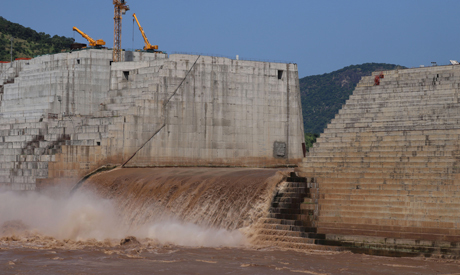Africa-Press-Ethiopia:
Egypt and Sudan rejected on Saturday a proposal by Ethiopia for data exchange on its disputed Grand Ethiopian Renaissance Dam (GERD), ahead of its planned second filling of the dam in July.
In an official statement, Egypt’s irrigation ministry rejected the Ethiopian proposal on forming a data exchange mechanism on the second filling of the dam without a comprehensive deal.
The statement said the proposal submitted by Ethiopia included “several fallacies and claims” that do not reflect the track of talks in the past years.
“The Ethiopian proposal violates the decisions of the African summits that have been held on GERD and affirmed the necessity of reaching a legally binding deal on the filling and [the] operating of the dam,” it said.
It added that the proposal was a “blatant attempt” to draw an Egyptian approval on the second filling of the Ethiopian dam – over the summer – even if the three counties failed to reach an agreement.
The ministry reiterated its refusal of any unilateral measures undertaken by Ethiopia, adding that it will not accept any “understandings or formulations that provide a political and technical cover for Ethiopian attempts to impose a fait accompli on downstream countries”.
The Egyptian statement came hours after Ethiopia invited Egypt and Sudan to “nominate focal dam operators to exchange data among the three countries with regards to the second filling, which will take place in July and August 2021.”
Nominating operators will soon expedite appropriate information, exchange arrangements and confidence-building measures until the conclusion of the GERD negotiations, under the auspices of the African Union, the Ethiopian water ministry statement said.
Sudan also rejected the Ethiopian proposal, accusing Addis Ababa of submitting the offer to alleviate “the Sudanese, regional and international pressure” on the dam.
Sudanese Foreign Minister Mariam Al-Sadiq said that the proposal by Ethiopia came as Addis Ababa prepares to discharge between 600 million cubic metres to one million cubic metres of water on Saturday to test the dam’s gates.
“Any exchange of data without a legally binding deal is considered a [work] of charity from Ethiopia that can be suspended anytime it wishes,” said Al-Sadiq, stressing on the gravity of the issue on Khartoum’s agricultural projects and strategic plans.
Cairo and Khartoum’s rejection of the offer by Addis Ababa comes as tensions continue to linger after the latest round of Kinshasa talks, held between the three countries, in an attempt to re-launch deadlocked negotiations over the dam and had failed to reach an agreement.
Ethiopia’s rejection of several proposals by Egypt and Sudan on the negotiations’ mechanism has led to a collapse of meetings and failure to reach an agreement over relaunching the talks.
It plans to move forward with the second filling of the dam — set to take place in July — despite the objections of Egypt and Sudan over the execution of such a move in the absence of a legally binding deal.
The second filling aims at collecting around 18.4 bcm of Blue Nile water, up from the 4.9 bcm secured during the first filling last year.
Egypt’s President Abdel-Fattah El-Sisi called on Ethiopia last week not to compromise Cairo’s share of Nile water, saying “all options are possible,” while stressing that “cooperation is better than fighting.”
His warning on GERD came nearly a week after he waved at “inconceivable instability in the region that no one could imagine,” stressing that his message is “not a threat.”
Egypt’s 100 million-plus population is dependent on the Nile water for 95 percent of its renewable water needs.
The country fears that the massive $4.8 billion Ethiopian hydropower project will significantly diminish its crucial water supply, which is already below scarcity levels.
Sudan fears the GERD will put the operation of its Roseires dam and the lives of Sudanese citizens – approximately 20 million Sudanese people – at “a very high risk” if an agreement regulating its operation and filling is not reached before the second filling.
Earlier on Saturday, Sudan said it has hoarded around 600 million cubic metres of water at the reservoir of its Jebal Aulia Dam against a possible “unilateral measure” by Ethiopia for a second filling of the dam in July.






